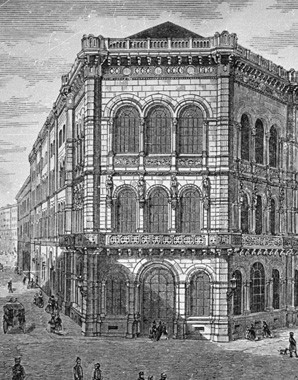The Emperor’s savings book and the State’s financiers – Banks and insurance in the Monarchy
Where could you – in theory, at least – meet the Emperor if you did not want to apply for an audience or embark on the long journey to Schönbrunn? At the bank.
Yes, Franz Joseph really did have a savings account with the Vienna Post Office Savings Bank (Wiener Postsparcasse). He had paid in 300 gulden to account number 000,001, which gave his occupation as ‘Emperor of Austria’. This imperial savings deposit was, however, rather the exception, because, together with the First Austrian Savings Bank (Erste Österreichische Spar-Casse), founded in 1819, the Post Office Savings Bank primarily provided the poorer sections of the population with savings facilities. The motivation for the establishment of these savings banks was above all a socio-political one and they were intended to serve as a way of providing for illness and old age, at least on a small scale. A comparatively broadly based social security network of health, accident and pension insurance was only developed towards the end of the nineteenth century. One of the first forms of insurance to be developed in the nineteenth century was against fire, and it became very popular because of the widespread use of timber for building. Next came transport insurance, which was closely linked to the development of the railway network, and then life insurance, which was initially seen by the state as dangerous, because it was thought that it would have an adverse effect on citizens’ morals.
While it was only the exception when the Emperor availed himself of the services of a savings bank, he and his predecessors regularly called on the help of private banking houses when it was a question of financing matters of state. In particular it was the banks owned by the Epstein and Rothschild families that repeatedly helped out the emperor and the state. For example, Epstein financed the war against Prussia, which nevertheless ended with defeat in the battle of Königgrätz (Sadova). In line with the liberal credo of the age financial support for trade and industry came from private and joint-stock banks. In any case, for long periods the state was simply not in a position to provide such support itself.


















